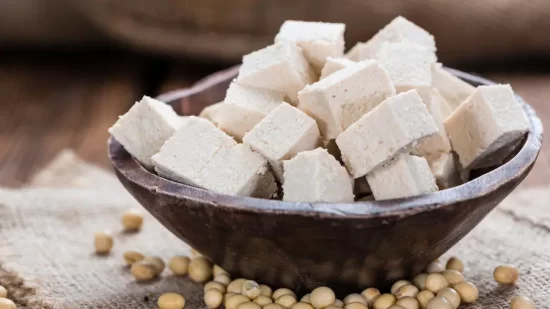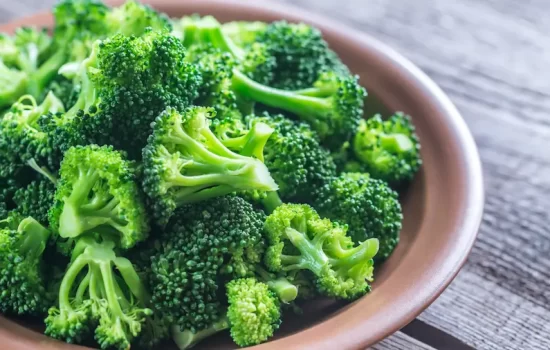Table of Contents
In recent years, the quest for healthier diets has led many to explore plant-based (Vegan) alternatives to traditional animal-based proteins. Tofu, a popular soy-based Japanese food, has emerged as a staple source of protein for vegetarians and vegans. One burning question that comes to the mind of health-conscious individuals is whether tofu is a complete protein source. In this article, we will delve deep into the nutritional aspects of tofu, examining its protein content, amino acid profile, and its status as a complete protein.
What is Tofu?
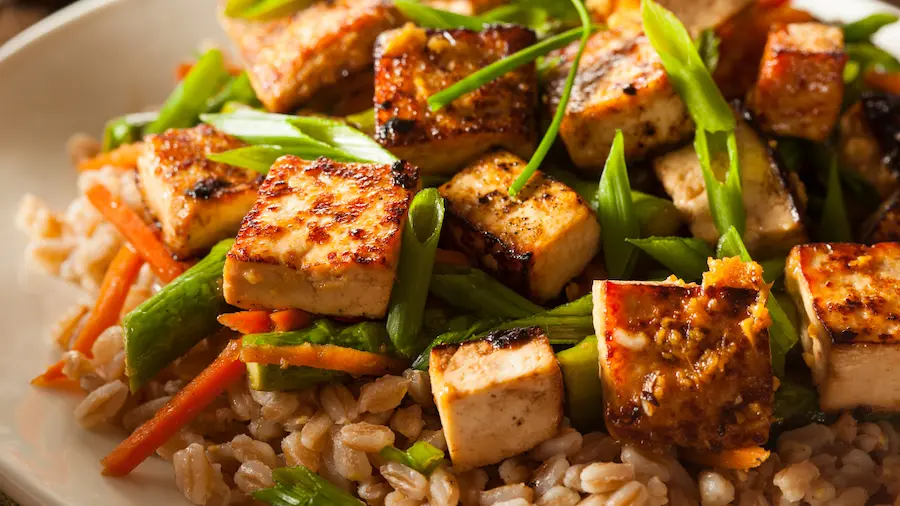
Tofu is a Japanese food, derived from soybeans, popularly known as bean curd. Although the origin of Tofu is Japanese, it is commonly used in various cuisines worldwide. Coming to the point of nutritional content, 100 gm of Tofu servings can give up to 17 gm of protein to the body. This is comparatively similar to that of Paneer, making it a substantial source of Protein for everyone, especially Vegans.
Tofu comes in two main types: Firm and Soft. Firm tofu is sturdy and keeps its shape, so it’s good for stir-fries, grilling, and baking. Soft tofu, also called silken tofu, is smooth and creamy, and people often use it in soups, smoothies, and desserts.
Scientists and Researchers also discuss whether tofu is a complete protein or not. Some say it has all nine essential amino acids but in different amounts. On the other hand, some argue that the amino acids in tofu are not balanced well enough to be called a complete protein. This debate has been happening for a long time, and there isn’t a clear agreement on whether tofu is a complete protein or not.
What is a Complete Protein?

Before we dive into the Tofu’s nutritional composition, it is essential to understand what is a complete protein.
Proteins are the building blocks of our body and are required to function properly. The proteins comprise various amino acids. If the protein that you intake contains all the nine essential amino acids then it is a complete protein.
Animal-source proteins such as meat, fish, poultry, or dairy products are commonly referred to as complete proteins. That’s because it generally has all the essential amino acids in it as well as in adequate quantities. But with the growing preference of people towards the vegan diet, the focus is shifting towards finding plant-based complete protein.
Tofu’s Nutritional Profile
The key factor that determines whether Tofu is a complete protein or not lies within its amino acid profile. Amino Acid profile means what all amino acids it contains. Tofu contains all the essential nine amino acids in varying amounts such as isoleucine, histidine, leucine, methionine, lysine, phenylalanine, threonine, tryptophan, and valine making it a complete protein. Plant-based protein usually lacks these essential amino acids.
Vitamins and Minerals
Tofu is packed with essential vitamins and minerals. It’s rich in manganese, providing about 0.5 milligrams in every 100 grams. Manganese plays a crucial role in keeping your bones healthy and helps your body process carbohydrates and protein.
Additionally, tofu is a good source of iron, giving you around 1.4 milligrams per 100 grams. Iron is vital for maintaining healthy blood cells.
Tofu is also high in magnesium, offering approximately 36 milligrams per 100 grams. Magnesium contributes to the well-being of your bones, muscles, and nerves.
Moreover, tofu is a great way to get calcium, containing around 130 milligrams per 100 grams. Calcium is essential for maintaining strong and healthy bones and teeth.
Copper
Tofu is a good source of copper, providing about 0.2 milligrams in every 100 grams. Copper plays a crucial role in maintaining healthy bones, supporting the nervous system, and boosting the immune system.
Fibre
Tofu is a good source of fiber, offering around 0.5 grams in every 100 grams. Fiber is essential for promoting healthy digestion and can also help lower the risk of heart disease.
Calorie – to – Nutritional Density
Tofu is a nutrient-packed food, meaning it provides a lot of nutrients compared to its calorie content. It offers a good dose of protein, vitamins, and minerals, making it a healthy choice for any diet.
In summary, tofu is a low-calorie, nutrient-rich food that serves as an excellent source of protein, vitamins, and minerals. It’s a healthy substitute for meat and a popular option for vegetarians and vegans.
Complementing Proteins
A 100-gram serving of tofu has about 8 grams of protein, similar to the protein in an egg. It’s important to note that the protein content can vary based on the brand and type of tofu. Generally, firm tofu has more protein compared to silken tofu.
Even though Tofu contains all necessary amino acid components, the relative levels of these amino acids can vary most of the time. This is why the term ‘Complementing Proteins’ comes into the picture. Complementing Proteins means blending various plant-source foods to ensure that the body gets proper intake of all the nutrition and essential amino acids.
There could be many ways to maximize the nutritional benefits. Intaking Tofu with whole grains can optimize the nutritional benefits making a well-rounded amino acid profile.
Tofu and Lysine
Lysine plays an important role in the functioning of the Immune system, Protein synthesis, Collagen formation, etc. It is one of the essential amino acids mostly found in meat, fish, and soya products. Other Plant-based protein has a low level of lysine in them.
On the other side, Tofu is rich in Lysine making it preferred over the other plant source protein.
Tofu vs Other Protein Sources
Tofu is a well-known plant-based protein, often measured against animal-based proteins like meat, dairy, and eggs. However, there are other plant-based proteins with nutritional value similar to tofu. In this part, we’ll compare tofu with other protein sources to help you decide which ones to include in your diet.
Other Soy Products
Soy products like tempeh and edamame are also complete protein sources and share nutritional similarities with tofu. However, they can be pricier than tofu and might not be as readily accessible in certain areas.
Beef and Fish
Beef and fish are full of protein and are commonly part of a balanced diet. However, they also contain a lot of saturated fat and cholesterol, so it’s best to eat them in moderation.
To sum up, there are plenty of plant-based proteins similar to tofu in nutritional value. Mixing different protein sources in your diet helps ensure you get all the essential amino acids your body requires for proper functioning.
Meat, Dairy, and Eggs
Meat, dairy, and eggs have all the essential amino acids our body needs, but they also come with a lot of saturated fat and cholesterol. Too much of these can raise the risk of heart disease and other health issues. Tofu, on the flip side, is low in saturated fat and cholesterol, making it a good option for those looking to cut down on animal products.
Ezekiel Bread
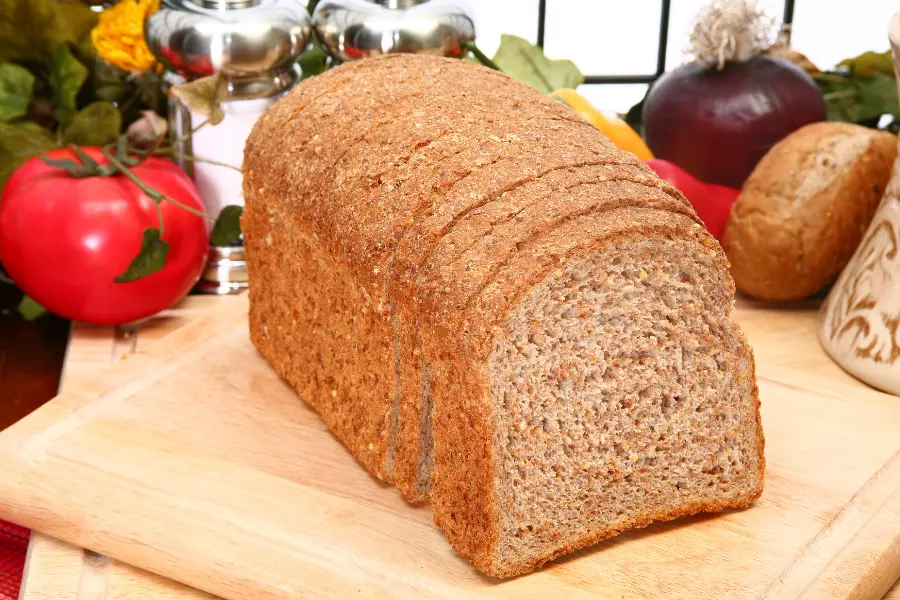
Ezekiel bread is crafted from sprouted grains and legumes, offering protein and fiber. Still, it’s not a complete protein on its own. It’s a good idea to pair it with other protein sources to make sure you get enough protein in your diet.
Various Meat Substitutes
Meat alternatives like seitan and veggie burgers are usually created using soy or wheat protein to imitate the taste and feel of meat. Even though they offer protein, it’s important to know they are often heavily processed and might have additives and preservatives.
Other Plant-Based Protein Sources
There are various other plant-based protein sources such as Chia Seeds, Pumpkin Seeds, Quinoa, Amaranth, Buckwheat, Hemp Seeds, and Legumes. These plant-based protein sources are complete proteins, serving as excellent alternatives to animal-based proteins. Additionally, they come with a good dose of fiber, vitamins, and minerals, making them a healthy addition to any diet.
Spirulina and Nutritional Yeast
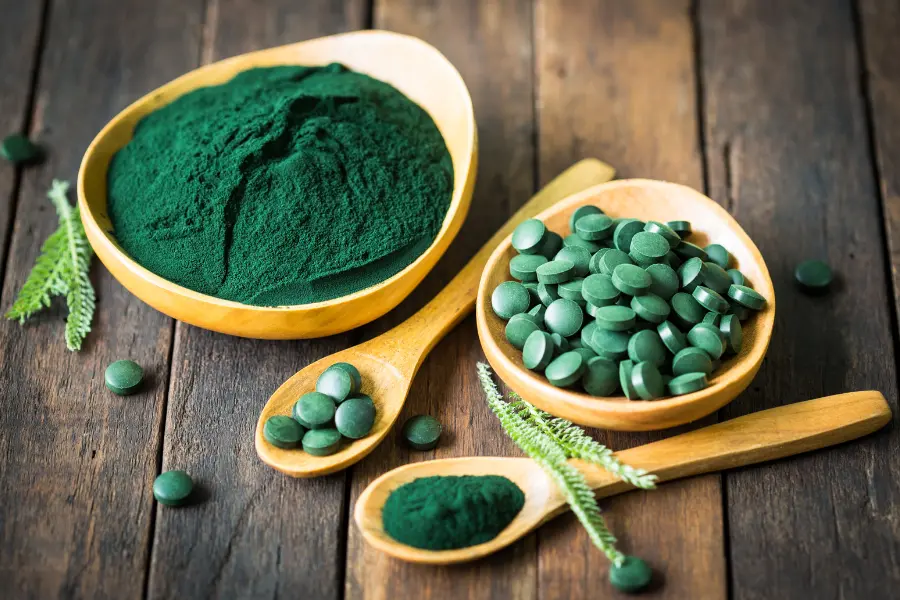
Spirulina and nutritional yeast are complete proteins and are commonly used as supplements or added to smoothies and various dishes. They also pack a punch of vitamins and minerals, making them fantastic additions to a healthy diet.
Healthy Benefits of TOFU
Tofu, a flexible and nutritious food, has been a part of Asian diets for centuries. Crafted from soybeans, it’s a fantastic source of protein, iron, and calcium. Additionally, tofu contains phytoestrogens, plant compounds associated with various health benefits.
Healthy Heart
Tofu is good for your heart as it’s low in saturated fat and cholesterol. Research suggests that including soy protein in your diet might help reduce LDL cholesterol, the “bad” cholesterol linked to an increased risk of heart disease.
Increases Bone Density
Tofu is rich in calcium, crucial for maintaining healthy bones. Studies suggest that including soy protein in your diet might contribute to increased bone mineral density, helping to prevent osteoporosis.
Helps in Maintaining Body Weight
Tofu is a smart choice for those aiming to shed some pounds, being low in calories and fat. Research suggests that soy protein, found in tofu, may assist in weight loss and management.
To sum up, tofu is a nutritious option with various health advantages. It offers protein, iron, and calcium while containing phytoestrogens that could have anti-cancer effects. Additionally, being low in saturated fat and cholesterol, tofu promotes heart health and may aid in weight management.
Cancer
Tofu has isoflavones, a kind of phytoestrogen that researchers have looked into for its possible anti-cancer properties. Some studies suggest that having isoflavones might lower the risk of breast and prostate cancer. However, more research is required to completely grasp the connection between isoflavones and the risk of cancer.
Fulfills Deficiency in Vegetarian and Vegan Diets
Tofu is a popular plant-based protein widely embraced in vegan and vegetarian diets. Made from soybeans, it’s a nutritious food packed with essential nutrients. Being a complete protein, it contains all the amino acids crucial for the body to build and repair tissues.
This versatile ingredient is an excellent source of protein, iron, and calcium, essential for the body. With low calories and fat, it’s a healthy choice for those aiming to maintain weight. Besides its nutritional value, tofu can be used in various dishes, serving as a meat substitute in stir-fries, curries, and stews, or as a filling for sandwiches and wraps.
In vegan and vegetarian diets, where protein can sometimes be lacking, tofu becomes a vital source. It’s also gluten-free, suitable for those with gluten sensitivities or celiac disease.
To sum it up, tofu is not just nutritious but also a delicious addition to vegan and vegetarian diets. It provides essential nutrients and serves as a complete protein source, aiding in building and repairing tissues.
Misconceptions & Concerns about Tofu
Soy Milk and Condensed Soy Milk Is the Same As Tofu
Some people think soy milk and condensed soy milk are like tofu, but that’s not right. They are all made from soybeans, but soy milk is a liquid, and condensed soy milk is a thick, sweet syrup. Even though they’re used in cooking and baking, they can’t replace Tofu.
Tempeh Healthy Alternative To Tofu
Tempeh is a kind of fermented soy product that some people think is healthier than tofu. But in reality, both tempeh and tofu are quite similar in terms of nutrition, and you can use them interchangeably in recipes.
To sum it up, despite some concerns and misunderstandings about tofu, it’s a safe and healthy food. It can be a valuable part of a balanced diet, and it’s essential to know the facts and make informed choices about the foods we eat.
Hormones and Estrogen Issues
A common mistake is thinking that tofu has hormones and estrogen that can impact the body. But that’s not the case. Tofu itself doesn’t contain any hormones or estrogen. While soybeans, the main ingredient in tofu, do have phytoestrogens (plant-based compounds that resemble estrogen), the amount in tofu isn’t enough to cause harm or mess with hormone levels in the body.
Firm Tofu Healthier Than Soft Tofu
A thought some folks have is that firm tofu is better for you than soft tofu. But actually, both kinds are crafted from the same stuff and have pretty similar nutrition. The big gap is in how they feel – firm tofu is tougher and chewier compared to the softer kind. It boils down to what you like and the recipe you’re cooking up.
Frequently Asked Questions
Is Tofu Better than Paneer?
Tofu and Paneer both look very similar and are highly nutritional in value. But Tofu is considered a healthier option compared to Paneer that’s because It is low in calories as compared to Paneer and High in nutritional benefits. It prevents various diseases such as Cancer and also lowers the risk of heart problems.
It is a plant-based protein source so vegans and vegetarians can also enjoy the slices of Tofu.
Is tempeh a complete protein?
Absolutely, tempeh is a complete protein source. It’s got all nine essential amino acids that your body requires to work the way it should.
What are some plant-based complete protein sources?
Plant-based complete protein sources consist of soy products like tofu and tempeh, along with quinoa, buckwheat, chia seeds, and hemp seeds. These options provide all nine essential amino acids necessary for the body to function properly.
Is cheese a complete protein?
Cheese doesn’t qualify as a complete protein source because it lacks certain essential amino acids required for the body to function properly.
What Tofu is made of?
Tofu is made of dried soybeans that are crushed heavily and soaked in water, boiled. Thus it is a completely Plant-based Protein and can be consumed by Vegan as well.
Examples of Plant-Based Protein?
Complete proteins can be found in animal-based foods like meat, fish, eggs, and dairy products. These foods have all nine essential amino acids that our bodies need to work well.
Conclusion
In the quest to find complete protein sources within the plant-based domain, tofu emerges as a nutritional powerhouse.
Made up of coagulated soy milk. It has several nutritional benefits other than Protein such as being rich in phosphorus, calcium, iron, and magnesium. Not only that combining Tofu with other nutritional food makes your overall food a wholesome meal.
Hope you liked this article. Don’t forget to checkout
Does whey protein cause Constipation?
Various Types of Protein Powder
For more interesting topics check out Wellness only on ConceptDive.





